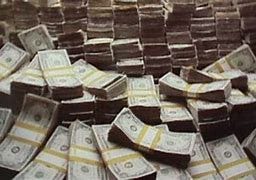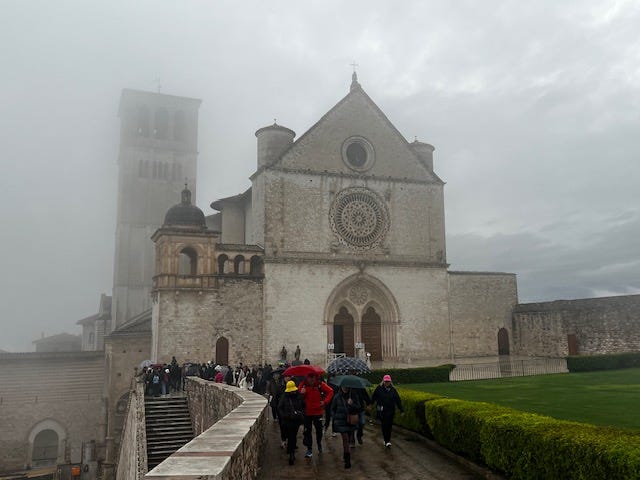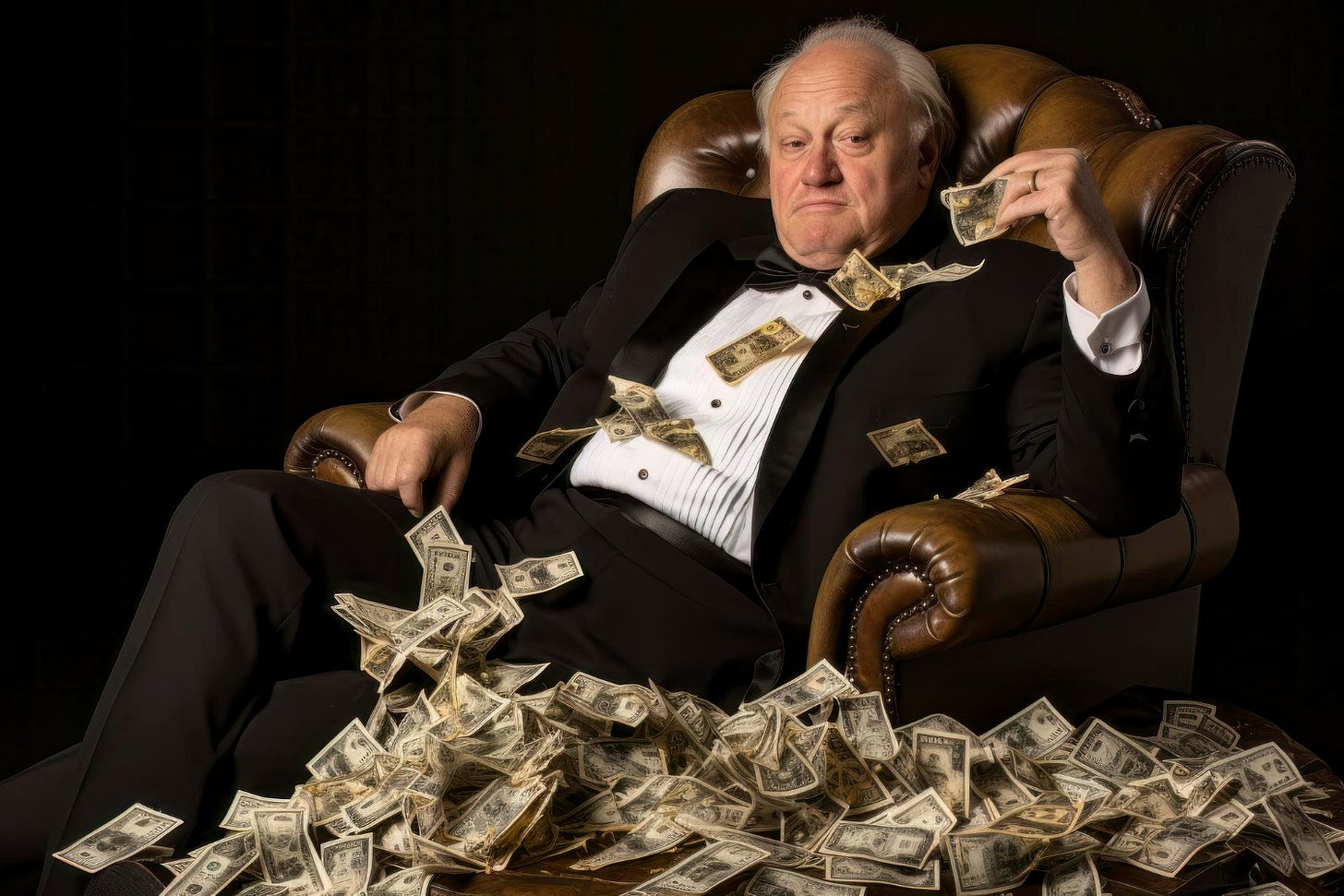The Pretender
St. Francis of Assisi and Jackson Browne both knew it—but did I?
Dear friends and readers—this essay is one of six written by a smart group of men—authors and writers—with whom I have the pleasure of gathering with regularly to discuss life and writing. Each quarter we engage in this exercise of writing on a common topic during the same week. We started last September with Fatherhood—then followed with Recovery as our Q4 theme. This quarter’s topic arrived as money. In our discussions we all discovered there were some challenges with writing honestly about money—so we reframed it as work and money. Like most things in life reframing something—or adding a little context to it—not only deepens the meaning but can also be a guide to understanding how you really feel about something, and how you might choose to express it.
Please enjoy. Here’s a link to each of the other fine gentlemen tackling this beast this week.
and

A quick preface to this essay. I had written this essay weeks ago with the knowledge that I’d be on my honeymoon this week in Italy and then on to Provence and then the Costa Brava. I felt a strong compulsion to add this preface today.
Yesterday we visited the Umbrian town of Assisi—the birthplace and home of Francis of Assisi. Standing in the Basilica named for him—particularly in this Lenten season—I was struck by how powerfully representative St. Francis is to this particular topic—work and money. St. Francis was the founder of the Franciscan order of Catholicism and was canonized as a saint by Pope Gregory IX two years after his death in 1226. In direct contrast to his wealthy upbringing, Francis chose a life of poverty, chastity, and obedience which enraged his parents—a wealthy Italian silk merchant father —and a noblewoman mother from Provence.
Like every human being—before and since—Francis carried all he had known as a youth with him for the duration of his life. How he chose to embrace or deny it was what made him. It does for all of us.
The written record of what Saint Francis beleived about the pursuit and glorification of money over 800 years ago has been chronicled and analyzed extensively. He lived his saintly adult life abhorring money as worth little more than dung. He never handled it physically. He was and is still today a powerful representation of the act of rebelling against a life ruled by money.
Ann and I stood awed at the magnificence of witnessing the powerful historical legacy that was before us.


Jackson Browne is a lyrical poet that I discovered young. What stands out in memory is a concert at the Mississippi River Festival when I was nineteen—the summer after my sophomore year at SMU. My friend Gregg and I took dates to see Jackson Browne across the river from St. Louis in Edwardsville, Illinois—my date was a first date—a setup with a friend of Gregg’s date Carrie. Her name was Cindy—I fell madly in love that night—starting a three-year romance. The ending of that youthful affair affected me in a profound way which I’ve written about previously. One of my favorite JB songs ties love and money together with a tidy sailor’s knot.
The Pretender was released May of ‘77—we heard it live that night a month later.
I'm gonna find myself a girl
Who can show me what laughter means
And we'll fill in the missing colors
In each other's paint-by-number dreams
And then we'll put our dark glasses on
And we'll make love until our strength is gone
And when the morning light comes streaming in
We'll get up and do it again
Get it up again
I'm gonna be a happy idiot
And struggle for the legal tender
Where the ads take aim and lay their claim
To the heart and the soul of the spender
And believe in whatever may lie
In those things that money can buy
Where true love could have been a contender
I don’t fully understand what that song—and those lyrics—set down deep inside me that night. It resonated then as it does now in a way much like the cynical lyrics of Donald Fagen and Walter Becker always have. The profound absurdity of modern life contrasted with our willingness to continue to play the game.
I needed both validation and approval in both love and work—and resented it. I didn’t understand that yet—I wouldn’t until much later in my life.
The construction project of our belief systems begins in childhood. We may have many teachers and fellow workers along the way but the foundation is built in our family of origin—the general contractors pouring the beams are our parents and siblings. The footers and columns that get sunk so deep include our beliefs around work and money.
Let me first say this: I know that am fortunate. Born to young white—intelligent and educated—loving parents. As children of the Depression—they started with nothing and made their own way in the world. Striving and increasingly successful—with three young boys—they had continual anxiety about money. When children feel free-floating anxiety they process it in different ways—but one way they always do it is to build up a system of defenses. We don’t know we’re doing it consciously—but we do it nonetheless.
I was not one of the lucky few who knew exactly what I wanted to be when I grew up. Blessed with talent and options—I had no freakin’ idea. Like many young boys—at various times I wanted to be a fighter pilot or a professional athlete. I wanted to be a musician and performer. For a time I imagined myself a stage or film actor. I did bits of all of them in my youth but did not burn hot enough for any of these life paths to actually forge a profession. I was too distracted by choice and too afraid of failure. Looking back at my life now—with some perspective—one thing I’m sure of is that I didn’t want money to be my ruler. I saw my father work his tail off until it nearly killed him at 60. What that meant for me as a child was constant turmoil—moving a lot—and not understanding why he was gone all the time. The defense story I built early on was that I didn’t want the same for my adult life. I was taught by my parents that money was scarce and important. Uncertain as to how to blend my fears and ambitions—I plowed ahead—eventually becoming that happy idiot struggling for the legal tender for decades.
In my younger days of fearless, reckless, and shameless I didn’t think much about the future. I lived for the now—for the thrill—for the experience. As a classic example of God’s sense of ironic humor—here I sit at 66 years of age—healthier than I’ve ever been—newly married with a dog family and a community of people that I love and who love me. I can’t not think about the future—yet much of my personal work revolves around staying in the Now. Touche God—you only give me what I can handle—when I can actually handle it.
Numerous other rockers have parodied the working life. The Huey Lewis and the News hit Workin’ for a Livin’. Mark Knopfler and Dire Straits with that ain’t working—that’s the way you do it.
All fun to sing to in the car as we’re on our way to—oh yeah—work.
Those of us born in the 50s, 60s, 70s, and 80s in this country generally—and I do mean generally—had the opportunity to truly play as kids. Outside. Beginning in the 90s with the Internet and since then with gaming, smartphones and social media—it’s different. One of my favorite authors and researchers Jon Haight writes extensively about this phenomenon and the issues it has rendered.
These are considered luxuries in many parts of the world where children are born into indentured servitude by necessity—as was the case in this country for far too long. Now with child labor laws children generally can’t be forced to work.
Work—for most of us—at least once we’re older and have perhaps more freedom to choose how we spend our time—is defined as performing some task or function for monetary compensation. Sometimes childhood family chores count if you’re paid an allowance. Personally, my work-for-pay history includes a wide variety of activities starting in my teenage years. Lawn-cutting business. Window washing. Moving furniture for a moving company. Dishwasher. I spent a summer pulling 5-20 gallon propane tanks out of a furnace into a cold water bath—for ten hours a night. I was a waiter. Retail sporting goods. Fitness instructor. Bartender. All these jobs were performed to have some running-around money—to meet girls—sometimes to pay rent—or to have a car—but always for running around money. And I ran around.
Then at some point after college I began the natural process of considering a career rather than just an hourly wage. What separates the two things? Being on our own I suppose. For some that begins sooner than for others. I was fortunate to have my university education paid for—so getting serious about adulthood was delayed a bit longer.
Ahh money. Let the measuring begin. What we do for a living begins to define us in different ways—for ourselves—and in the eyes of others. More so I think for men of my generation than for women.
What we do for work defines us—or does it?
Imagine George Clooney knocking on your door to sell you insurance.
Or Danny DeVito as your hairdresser.
Or Johnny Depp calling you to sell pens.
All actual jobs held by these now famous men—to make a living.
Money Habits
For a person like me who has struggled with addiction—money habits are just symptoms like my drinking was. I can never have enough to feel safe—and can never spend enough to be satisfied.
I can’t write this essay with sharing some of my habits around money. For a long time I judged myself for it. My attitude seemed to work fine for me but was so wildly different than everyone around me. That created discomfort for a long time. I resisted being ruled by money—but was now having some financial success. Conflict.
I’m 66 and I haven’t balanced a checkbook since I was 25.
I’ve been paid a lot—I’ve been paid a little.
I’ve had seven figures in my checking account—I’ve been overdrawn.
I once started a SaaS company and sold it ten years later for many millions of dollars. I owned just under half of it—my business partner the other half. Half of the total sale amount was paid in cash upon sale and the other half was set to be paid upon reaching unreachable incentives over three years—which were never met. Half of my half-share of the half paid up front was taken by federal and state taxes. What was left over was still a decent amount of money when you see it on paper. But not enough to retire. I could buy a nicer car. I could have nicer things. I could invest a little and invest in myself—pay off my house—all of which I did. My partner and I took good care of our other small share partner—and our employees. At the end of the day it felt good—but it didn’t make us rich. It was 2009—we felt extremely grateful to sell our company in a business environment when many other businesses were pulling back or shutting down.
What the experience did do is make us rich with a sense of accomplishment. Wealthy in spirit from having started something and seen it through to the finish. from having given 30 employees meaningful work for a decade and beyond. A sense of pride in having created something that has lasting value—several thousand companies from airlines to utilities to packaged goods companies to banks to retail still use our software product to this day.
So was it the work or was it the money that made us wealthy? Clearly the former.
But we measure our success in this culture by the number—by the $$$. The bank account. It was never the reason I started the company. It was never the reason my business partner and I worked day and night to get to the finish line. We didn’t necessarily anticipate the many stresses of small business ownership. I didn’t anticipate putting myself and everyone else through the acceleration of my alcoholism.
Now in my recovery I spend time examining my relationship with money—just as I do every other relationship with things. Many people go on throughout their lives thinking this is just the way I am—or the way life is—and never unpack the fact that our some of our most deeply-set behaviors are defense systems from our family of origin. I never understood that my reckless behavior around money came from the defense system I built against the anxiety I felt as a child. Not until I began to unpack it in recovery. My Dad tried repeatedly to teach me about money and build some responsibility around it. Irony being the working word here—I started my initial business career managing money. Everyone’s except my own. Happy idiot indeed.
I spend pretty much everything I make. Always have. I’ve spent, donated, given away and pissed away a lot of money. When I’ve needed to make money—I’ve thus far in my life been able to pull a rabbit out of the proverbial hat.
I’ve taken money that didn’t belong to me. I’ve been given money by others. I’ve given money to others that I didn’t really have to give. I’ve been swindled out of money. I’ve lost money in spontaneous and unwise investments—5 acres in Costa Rica that you can’t get to except on foot or on horseback anyone? I’ll make you a good deal. Probably not a good idea to buy property in a foreign country sight-unseen—or do it while hammered.
Money has never motivated me for its own sake. Honestly. I like it as much as the next person. But making choices in my life—or my career—strictly for the paycheck has never appealed to me.
The Emotional Toll
They say money can’t buy happiness. It’s true that some of the most emotionally immature, mean, and dysfunctional people I’ve ever met in my life have had the most money. I’ve met plenty of them through the decades. I’m sure it had an impact on my attitude about money. If money turns a person into that I don’t want any.
It’s hard to talk about money honestly. I feel very vulnerable writing those sentences above. I’m not sure why—I just do. It’s the truth. It shouldn’t be that hard. But it is.
Now at 66 I don’t make much money. A little consulting gig now and then when I feel like it which is mostly never these days. I spend 20-30 hours a week volunteering. In many respects the work I do now as a volunteer means more to me than the paid work I’ve done for decades. Helping those that still suffer with addiction—and building community where I live.
I own all my assets outright and enjoy very low living expenses. I make a little bit from my assets working for me.
One credit card for emergencies—everything else is paid for in cash or with a direct debit card. I owe nothing. To no one. Truth be told I owe a lot of people for helping me find the clean and sober path in life for the last 14+ years—but I don’t owe them any money. Thank you!
There was never going to be a pension. I had a 401K briefly at two points—but those funds have long since been plowed into property. I don’t think I’ll run out of money but life is uncertain. Hasn’t our world shown us that no one can completely shield themselves from the uncertainty of the world?
I told my father exactly that back in 2009. Dad you know I’ve lived well and had fun. If I got hit by a bus tomorrow I have no regrets. The next conversation he had was about scheduling my intervention.
My parents have been financially successful so at some point—God willing and the crick don’t rise—my brothers and I stand to inherit a few dollars—but I’ve never thought much about that. My parents are a blessing—alive and relatively healthy in their late eighties. My Dad has already outlived the men he comes from by 30+ years. My Mother’s side—of strong Irish stock—live into their nineties and beyond. When I was younger I’d always thought they’d outlive me—and they still may—so I’ve never thought much about what might be left over for me.
I have a good friend that I ride motorcycles with. He nets over 10K a month from two lifetime pensions—20 years in the Marine Corps and 20 years teaching. Good for him. I seriously have no idea what that feels like. Financial planners and smart investors can map a route for anyone to follow with proper saving and controlled spending. Good for them—that was never gonna be my path. I’m still standing.
Currency is a utility that pays for our needs and our desires. Financial wealth is equal parts an aspiration—a badge—and a curse. If you’re able to set aside the feelings of fear, inadequacy, FOMO, and whatever other negative emotions that arise around money in our culture—then you are tougher than most. Very few of us are willing to take the extreme pledge of poverty, chastity, and obedience like the Franciscans. It’s hard to operate in the modern world without playing the money game. We modern humans may not beat—enslave—or imprison our poor like they did in the 1200s—but we still caste others out for having no money—just as they did St. Francis of Assisi eight centuries ago.
In early AA I heard from oldtimers quite a bit that it would be pink or green that would trip me up—sex or money. I work hard these days to want what I have rather than having what I want. Maybe I’ll be alright.
Out into the cool of the evening
Strolls the pretender
He knows that all his hopes and dreams
Begin and end there





James beat me to it, so I won't quote the construction metaphor again, but it's a really strong paragraph. And it's so hard to untangle our adult selves from these messages, much less know how to communicate them to our kids.
My kids are growing up without any real sense of need. I don't want to impose false scarcity on them just to teach gratitude, and I don't want to send them out into the world wholly reliant on inherited wealth as a fallback plan. But there seem to be some very narrow lanes for pursuing a livelihood without falling into the hustle culture. And the messages I'm hearing most often on LinkedIn and other places about investing in yourself, building a personal brand, etc, are exactly what I want to steer them away from. I don't want my kids to work so they can afford "stuff." But it's really very hard to escape that trap. I'm glad you were able to find your way to integrity and autonomy.
“The construction project of our belief systems begins in childhood. We may have many teachers and fellow workers along the way but the foundation is built in our family of origin—the general contractors pouring the beams are our parents and siblings. The footers and columns that get sunk so deep include our beliefs around work and money.”
This is so true and such a beautiful way of putting it. I would say that OUR life begins when WE recognize what beliefs are running the show inside our subconscious, and WE decide which of those beliefs work for us, and which ones don’t. And then the harder work starts after that awareness, when we begin to remodel that belief foundation that was given to us, while at the same time adding new rooms to our house that we consciously choose. So, we’re remodeling and building at the same time. And in my experience that is disorienting, and at the same time majestic. Our life’s work is to stay on that path.
And then if we have kids, a new phase of our work is to support their remodeling process, of the footers and columns we’ve poured into them, that don’t work for who THEY uniquely are and the path they will choose in life.
Thank you for writing such a thought provoking and insightful piece.